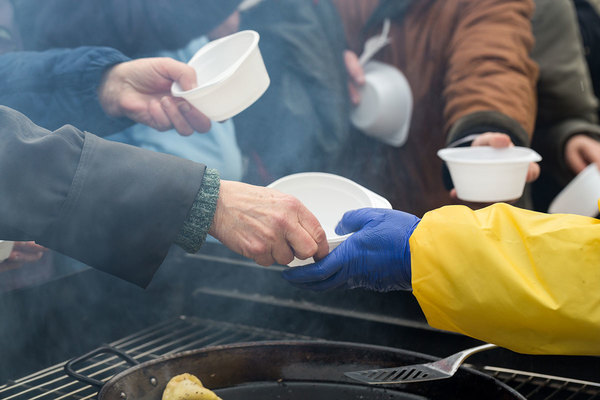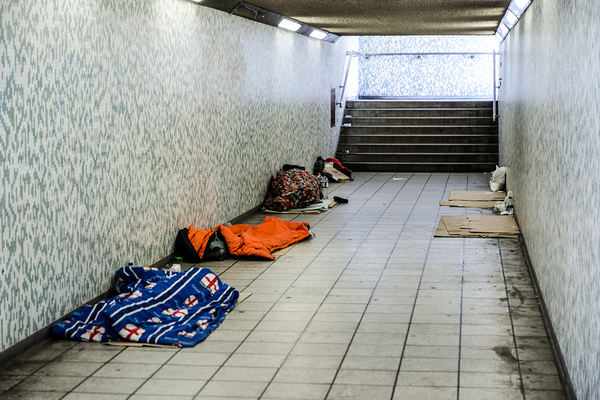London’s largest network of night shelters forced to turn away rough sleepers due to coronavirus fears
The largest network of emergency winter night shelters in London is calling on the government for guidance after it was forced to turn away a rough sleeper from its service due to coronavirus fears.
Glass Door, which provides shelter to around 170 homeless people per night in London, had to turn away an individual after it was brought to their attention that the person had recently spent time in Northern Italy.
The shelter manager called NHS 111 and was advised that the individual should not share a sleeping space with others due to the risk. As a result, the person, who did not turn out to have the virus, spent the night at King’s Cross and Victoria stations.
Megan Preston, service development manager and coronavirus lead at Glass Door, said: “If he had had the virus then there’s obviously that public health risk for that one night that we couldn’t admit them into the shelter on the NHS’ advice – he had no choice but to go to public places.
“He went to a major train station and a major coach station – that was the only place where he was able to get shelter when he was turned away from our service for the protection of our other guests.”
Glass Door said it has a rigorous process in place to identify whether someone is at risk of coronavirus and is unable to admit people to their shelters if they meet the criteria for being at risk.
Ms Preston said: “There’s been no clear guidelines published. There’s nothing at the moment where the government has clarified how local authorities should be supporting rough sleepers who are at risk.
“We believe they should be providing some sort of safe temporary accommodation where somebody can self-isolate.”
She said Glass Door has also struggled to provide food at its night shelters as it cannot book a delivery slot from a supermarket for the next three weeks, as households stockpile goods.
It comes as several other homelessness charities, including Crisis and St Mungo’s, express their concerns about the impact of coronavirus on the homeless population.
Jon Sparkes, chief executive of Crisis, said: “Crisis is urgently requesting guidance from the government on how to protect people who are homeless, specifically rough sleepers, against coronavirus.
“People sleeping rough are particularly vulnerable because they are more likely to have a range of existing health conditions and face specific challenges in that they may be unable to regularly wash their hands, nor can they self-isolate if they feel unwell.
“This guidance must set out what measures government is taking to ensure rough sleepers get appropriate health checks, what accommodation will be provided so that people can self-isolate and advice for the public on how best they can support people who are homeless during the coronavirus outbreak.”
Howard Sinclair, chief executive of St Mungo’s, said: “Right now, our teams are out as usual meeting people to talk about housing options and also offering support around health and well-being.
“In response to coronavirus we have a senior group established to lead, act and monitor the situation across our services, including assessing staffing levels that would be needed to safely manage client-facing services, in line with our business continuity plans for major incidents. We are promoting best practice Public Health England (PHE) guidance including posters about handwashing and cleaning.
“Should any member of staff need to self-isolate, in line with PHE guidelines we will be paying them their full salary.
“If you are concerned about someone sleeping rough we urge people to get in touch with Streetlink to help connect someone with their local services as soon as possible.”
As of yesterday, there were 590 confirmed cases of coronavirus in the UK and the government confirmed that it was moving into the ‘delay’ phase of its response, meaning anyone with a fever or a new, continuous cough is being asked to self-isolate for seven days.
A government spokesperson said: “We’re well prepared to deal with the potential impacts of coronavirus and are already working closely with local authorities to support vulnerable groups including homeless people.
“We’ve announced a £500 million Hardship Fund so local authorities can support economically vulnerable people and households and we will publish further guidance for hostels and day centres shortly.”
Update: at 10.26am 16/03/20: This story was updated to include a response from the government
Sign up for our daily newsletter
Already have an account? Click here to manage your newsletters














